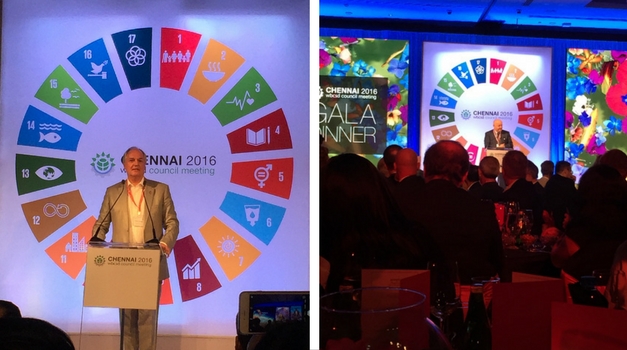WBCSD Council Meeting 2016
The theme of the WBCSD Council Meeting this year was Implementing
Sustainability at Scale. SBC’s Belinda van Eyndhoven was there as the New Zealand Global Network Partner representative.

The theme of the WBCSD Council Meeting 2016 in Chennai, India was Implementing
Sustainability at Scale. It’s easy to see why when you realise the scale of both the
issues and opportunities that India is facing. It is home to 18% of the world’s
population (1.3 billion) and is one of the world’s fastest growing economies, but with over half the population living on less than $NZ5.00 a day there are
some major sustainability challenges. Interestingly India is the first country
in the world to mandate corporate spend on sustainable outcomes (businesses
with annual turnover of more than INR
10bn ($NZD212m) must spend 2% of their net profit on CSR activities – whether
this is making a meaningful difference on the ground is still being debated).
What really struck me from getting out and meeting with
local people was the similarities rather than the differences. We all want
similar things; a good future for our families; strong and connected communities; and a healthy environment. Education, sanitation and innovation are all central
for India to achieve this. The Sustainable Development Goals (SDGs) capture
these aspirations and were front and centre for this Council Meeting.
The plenary day
kicked off with WBCSD President Peter Bakker celebrating the huge shift in the
previous 12 months, including the release of the SDGs and the signing of the Paris
Agreement. Peter discussed the three major changes he thinks we will see
globally in the next few years:
- The pace of the transition to
a low carbon economy - A heightened focus on corporate
governance and risk disclosure via increased rules and legislation - A shift to systems thinking
and transformation to achieve the SDGs.
Peter concluded with the challenge that our role is now not to
agree but to implement
Paul Polman, WBCSD’s Chairman and CEO of Unilever, then
echoed these sentiments and stressed that if business is not actively helping
achieve the SDGs then why would society need or want us around? He reminded delegates that to achieve systems-level change leaders
needed to continue to get out of their comfort zone, saying “if you are not having
uncomfortable conversations within your business about your sustainability then you
are not having the right conversations”.
The rest of the day centered around updates on WBCSD work
programmes and other interesting developments. Notable mentions include:
- A call for business to develop sector roadmaps to deliver the SDGs. Could we do this in New Zealand?
- The global food challenge and the rising dilemma of the over-fed but under-nourished. What role can New Zealand businesses play in this for th international market but also for the health of our own country?
- A breakthrough in consumer decision-making – The WBCSD Better Life 2.0 report due out in early 2017.
- The launch of the Social Capital Protocol, a partner to the Natural Capital Protocol, in early 2017.
- The work done by the Task Force on Climate Related Financial Disclosures (TCFD) on bringing climate-related financial reporting to a mainstream audience. There will be a public release on the next phase of the document in early 2017.
- The Business and Sustainable Development Commission will release its flagship report in January 2017. This will be the fact base for outlining the size of the estimated US$11 trillion prize that will be within reach through $US4 trillion of investment if the world achieves the SDGs.
- Interesting work by Ernst & Young looking at enterprise risk management and sustainability reporting – from their recent review an alarming 35% of businesses were found to have no alignment between their filed risk disclosures and their sustainability reports. There was a call to better align material sustainability risks with organisational risk registers and to be disclosing these. A paper on these findings will be published later this year.
During the Global Network (GN) day I joined colleagues representing
18 Business Councils from around the globe. Collectively the WBCSD and the GN
have a membership of over 5,000 leading businesses.
We heard about some of the interesting work our counterparts
are doing including Portugal BCSD’s work on energy, climate and economic growth
and that our colleagues in Australia (Sustainable Business Australia) are having a multi-stakeholder
workshop next month to aid momentum on the SDGs.
It was pleasing to see that the robustness of our member
review and our member commitments at the SBC are leading practice amongst our global
partners. They were interested to hear how our climate work was going, the
member response to the Natural Capital Protocol and to learn more about our
Value Chain Guide.
As I departed Chennai I reflected on the great sense of camaraderie among participants
with plenty of opportunity to learn and share practice. There was a strong sense of
businesses ‘owning’ the SDGs; a substantial acceleration in business activity; and a shared sense of urgency to start collaborating and scaling solutions. Partnerships
were heralded as the best way to do this meaningfully and at pace. The take
away message to business was GET INVOLVED!
The key message for me was that New Zealand needs to play to its strengths – being active in clean energy; innovation around climate-smart agriculture; and the ability to design and implement system transformations. New Zealand business has an important
role to play in achieving the outcomes sought by the SDGs, and the Sustainable Business Council looks forward
to continuing to work with members and partnering with other great
organisations to achieve these.
SBC’s Belinda van Eyndhoven attended the WBCSD Council Meeting in Chennai, India in October 2016 as the New Zealand Global Network Partner representative.
Contact:
Phone:
Email:
